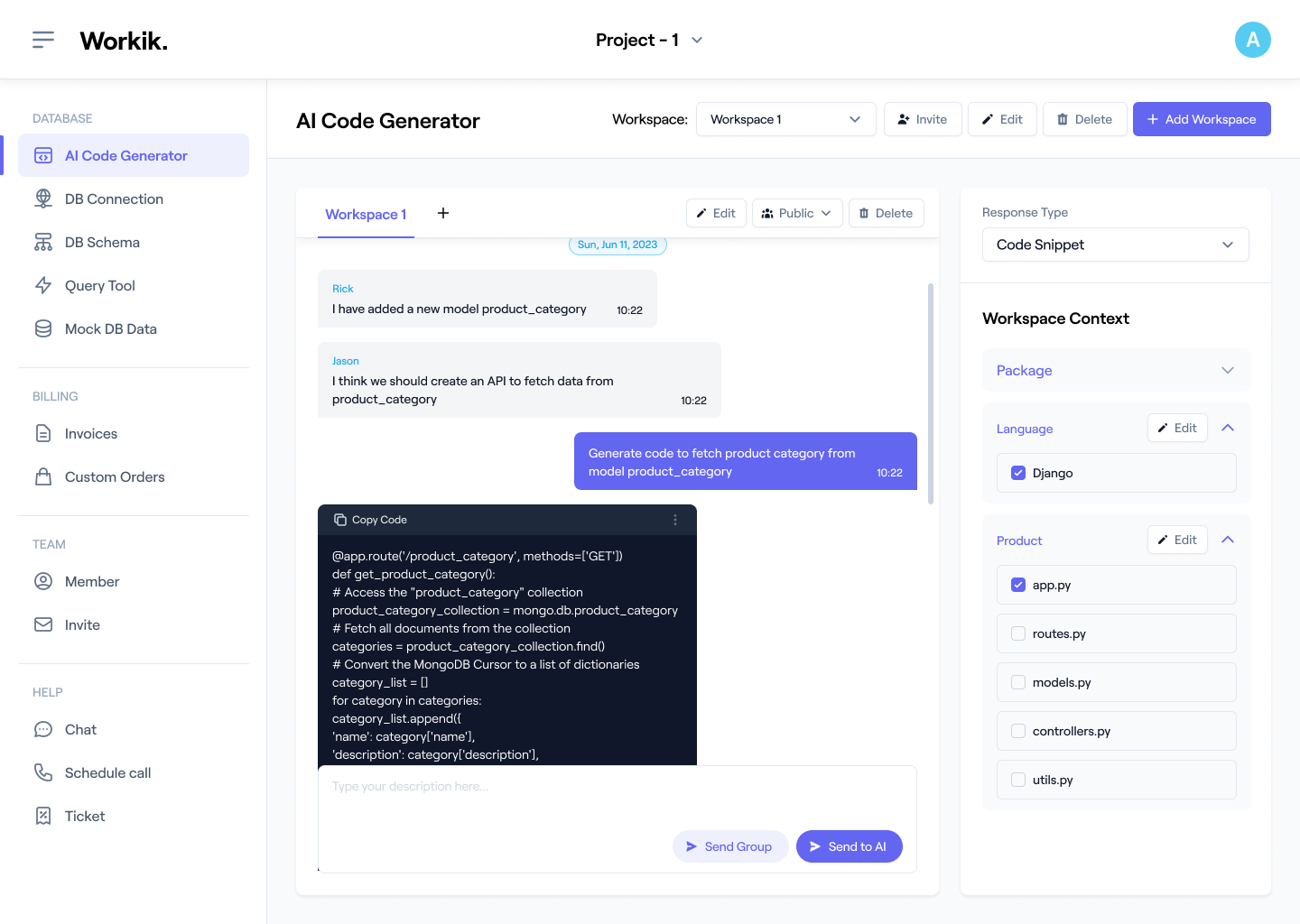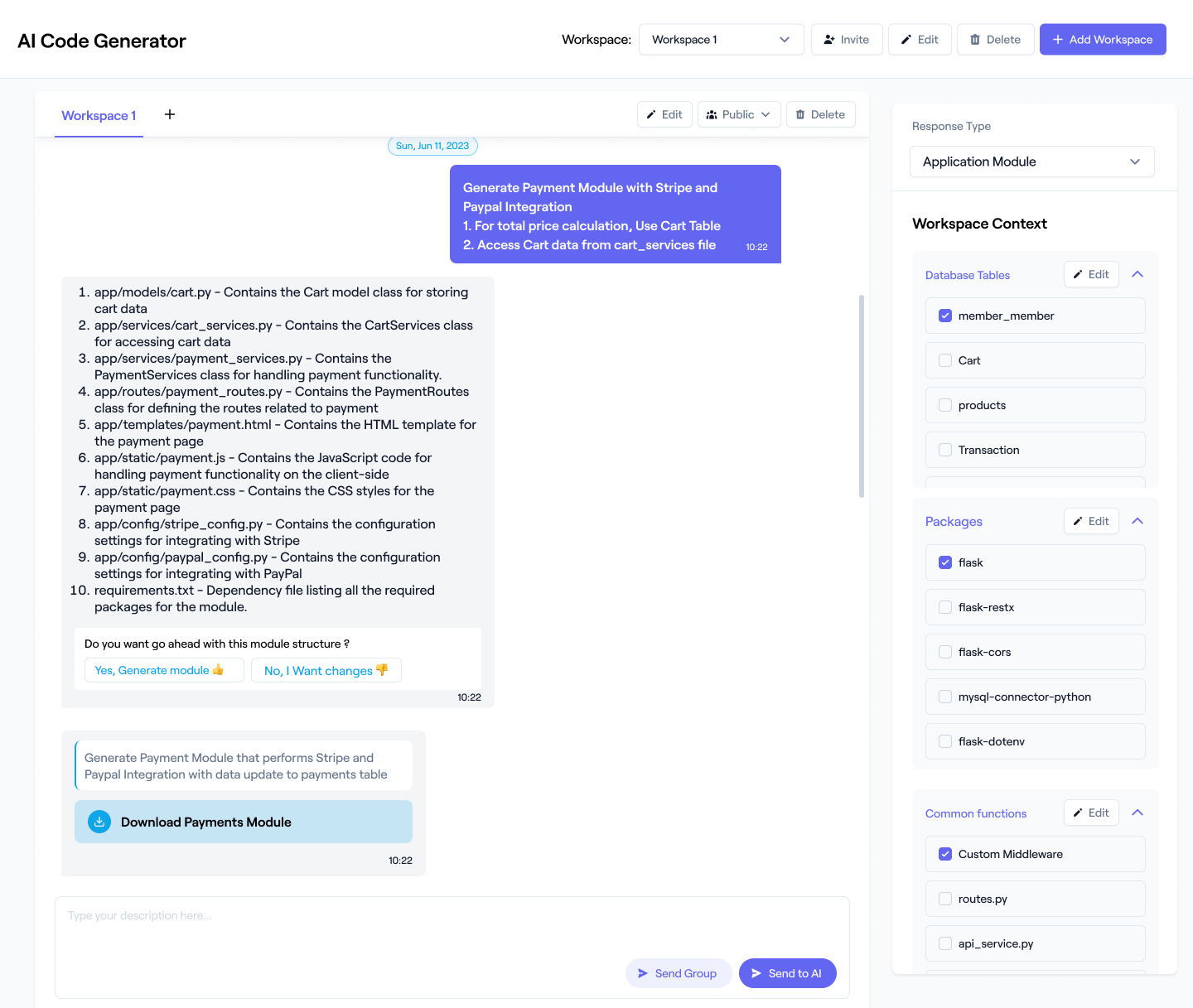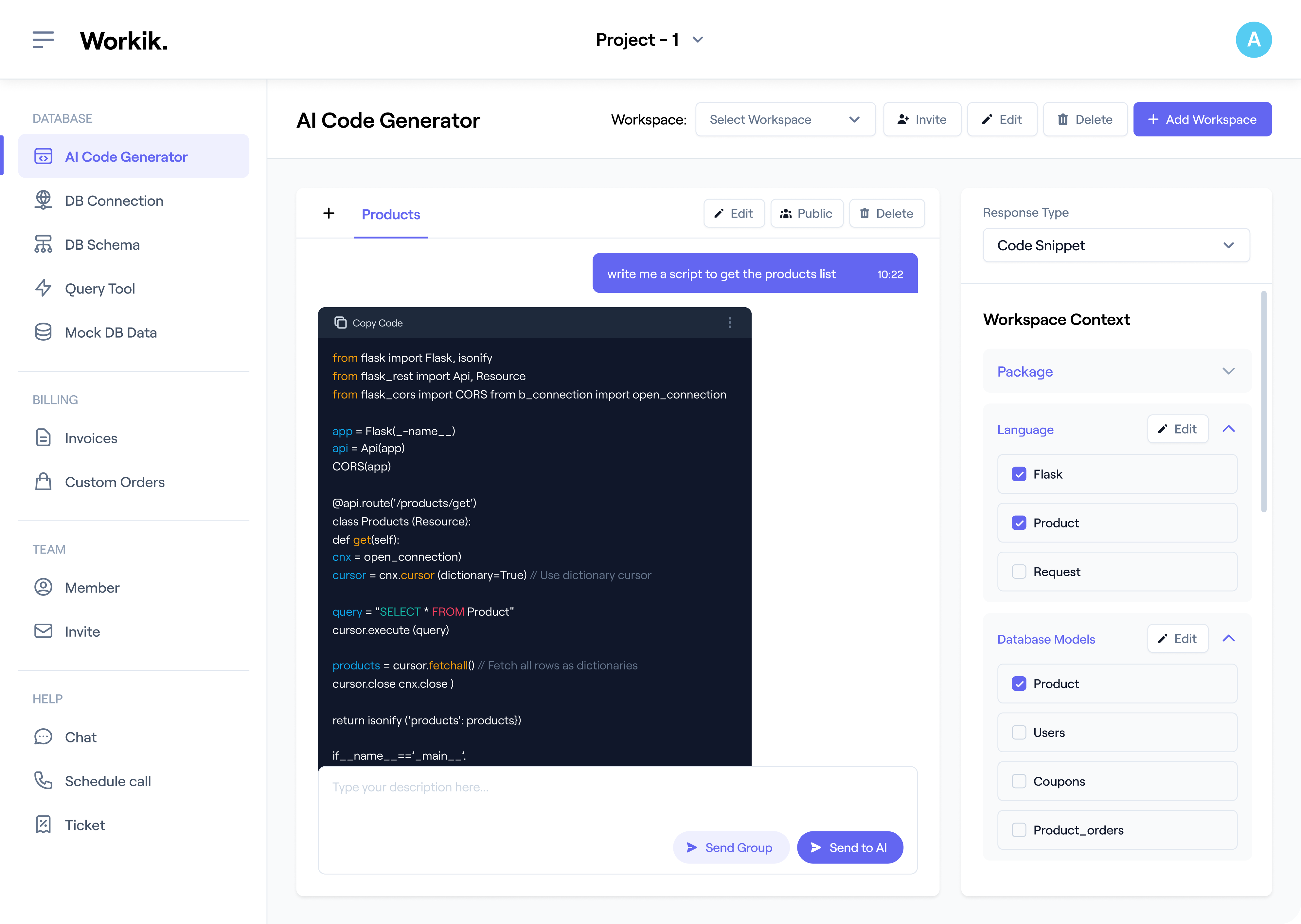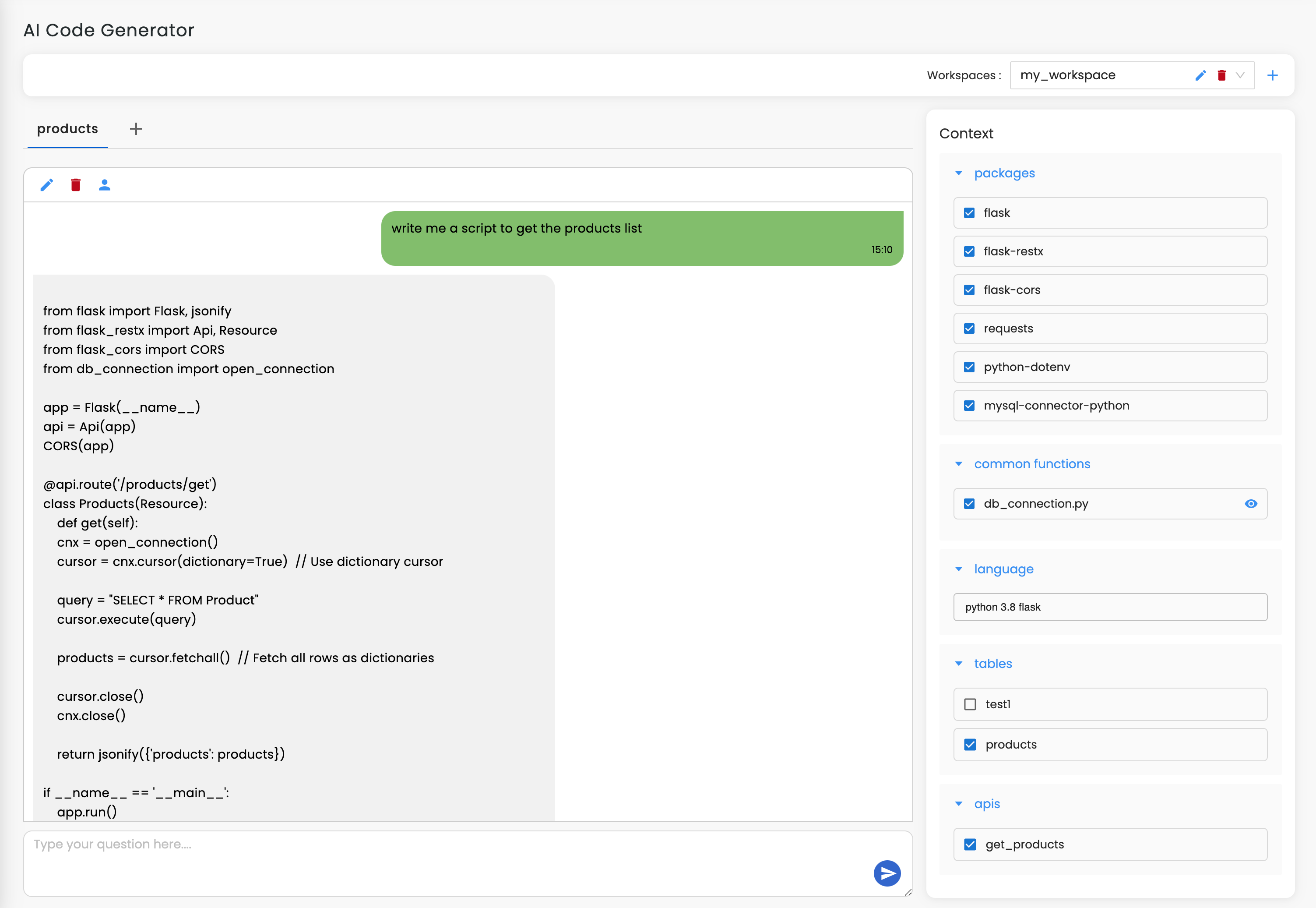
Join our community to see how developers are using Workik AI everyday.
Features

Smart Refactoring
AI refactors your code intelligently, adapting to your preferred transitions like React to TypeScript or Django to Node.js.

Simplify code
AI simplifies complex structures like turning nested loops and conditionals into reusable functions, tailored to your codebase.

Update Legacy Code
AI can help with legacy code, such as converting jQuery to ES6 or Python 2 to Python 3, optimizing for modern frameworks.

Efficient Code Cleanup
AI actively cleans up redundant code, merges functions, and organizes imports, ensuring a streamlined, efficient codebase.
How it works
Sign up on Workik, set up your workspace, and easily integrate your existing codebase and tools.
Integrate repositories from GitHub, GitLab, or Bitbucket, define libraries, frameworks, and project-specific needs to tailor Workik AI’s refactoring process.
Use AI to refactor, debug, and optimize your code by refining library usage, improving coding patterns, and enhancing overall performance and maintainability.
Share refactored code for real-time feedback. Automate ongoing refactoring to keep your codebase clean, efficient, and scalable.


Expand


Expand


Expand


Expand


Expand


Expand


Expand


TESTIMONIALS
Real Stories, Real Results with Workik
Workik’s AI transformed our legacy code into modern, efficient structures without breaking anything!

John Mendez
Lead Developer
Code refactoring for performance optimization has never been easier. Workik pinpointed inefficiencies instantly.

Priya Desai
Software Engineer
Cleaned up huge codebases for readability. Workik’s AI refactoring tool handled it without any oversight.

Alex Wong
Technical Architect
What are popular use cases are ideal for Workik’s AI-powered refactoring?


Popular use cases of Workik AI for code refactoring include but are not limited to:
* Framework Upgrades: Moving from AngularJS to Angular or JavaScript to TypeScript.
* Performance Optimization: Refactoring to reduce runtime complexity or optimize database queries.
* Code Migration: Migrating from Monolith to Microservices for a more modular architecture.
* Database Refactoring: Switching from SQL to NoSQL databases like MongoDB, updating query logic to align with the new schema.
What contexts can I add to optimize AI-powered code refactoring in Workik?


To enhance AI-powered code refactoring in Workik, you can:
* Specify languages (e.g., Python, Java, JavaScript).
* Include relevant frameworks (e.g., React, Angular, Django, Flask).
* Mention specific libraries (e.g., NumPy, TensorFlow, Express.js).
* Point out files or modules needing refactoring.
* Provide details about your database structure.
* Share API designs or documentation to ensure consistency.
How does Workik AI refactoring streamline onboarding and team collaboration?


Workik AI refactoring ensures a clean, optimized, and easy-to-understand codebase, making it simpler for new developers to onboard. Teams can maintain consistent coding practices, improving collaboration and managing the project at scale.
Can Workik’s AI help with migrating legacy code?


Absolutely. Workik's AI-powered refactoring excels in migrating legacy code. Whether refactoring PHP to Python or jQuery to React, AI modernizes your code while maintaining functionality.
What refactoring strategies does Workik’s AI use?


Workik AI employs several strategies, including:
* Code Decomposition: Breaking down large, complex functions into smaller, more manageable ones.
* Code Reuse: Identifying patterns and extracting reusable components, classes, or functions.
* Dead Code Removal: Automatically identifying and removing unused variables, functions, or blocks of code.
* Error-Prone Code Fixing: Refactoring common anti-patterns, such as nested if-else conditions, into more efficient structures like switch statements.
Can't find answer you are looking for?
Request question

Request question
Please fill in the form below to submit your question.
Generate Code For Free

Code Refactoring: Question & Answers
Code refactoring is the process of restructuring existing code without changing its external behavior. The goal is to improve the code’s readability, performance, and maintainability by optimizing its structure, removing redundancies, and following best practices. Refactoring is crucial for maintaining scalable and efficient codebases over time.
Popular frameworks and libraries used in code refactoring include:
1. JavaScript/TypeScript:
ESLint (code linting), Prettier (code formatting), JSHint
2. Python:
Black (code formatting), pylint, autopep8, Rope (refactoring library)
3. Java:
IntelliJ IDEA (refactoring tools), Eclipse (built-in refactoring), Checkstyle
4. C++:
Clang-Tidy, ReSharper C++, Visual Studio Code Analysis
5. Ruby:
RuboCop, Reek, RubyMine
6. PHP:
PHP_CodeSniffer, Rector, PhpStorm
7. Go:
Golint, GoMetaLinter, GoVet
8. Swift/Kotlin:
SwiftLint, SwiftFormat, Detekt (Kotlin static code analysis)
Popular use cases of code refactoring include:
1. Performance Optimization:
Improve performance by optimizing loops, reducing memory usage, and simplifying algorithms.
2. Readability Enhancement:
Enhance code readability to make it easier for developers to understand and maintain.
3. Reducing Technical Debt:
Address inefficiencies and ensure scalability.
4. Legacy Code Modernization:
Update legacy code to align with modern best practices and design patterns.
5. Bug Fixing:
Identify and resolve bugs by restructuring code, which helps catch potential issues early.
Professionals skilled in code refactoring can pursue roles such as Software Engineer, DevOps Engineer, Code Quality Consultant, Technical Lead, Site Reliability Engineer (SRE), Full Stack Developer, Backend Engineer, Technical Architect, and Legacy System Modernization Specialist.
Workik AI provides extensive support for code refactoring, including:
1. Code Readability Enhancement:
AI analyzes and restructures code to improve readability by removing redundancies and following best practices.
2. Performance Optimization:
AI suggests optimizations in loops, memory usage, and algorithms to enhance code performance.
3. Automated Refactoring:
AI automatically identifies areas that require refactoring and provides suggestions for simplifying code structures.
4. Legacy Code Modernization:
AI updates outdated code to align with modern programming standards, making it easier to maintain.
5. Error Detection and Debugging:
During refactoring, AI detects potential issues and bugs, ensuring that the refactored code is error-free and functional.
Explore more on Workik
Code Generators
Get in touch
Don't miss any updates of our product.
© Workik Inc. 2026 All rights reserved.

